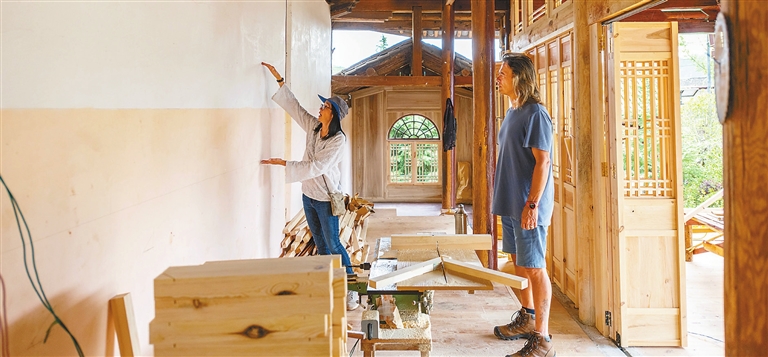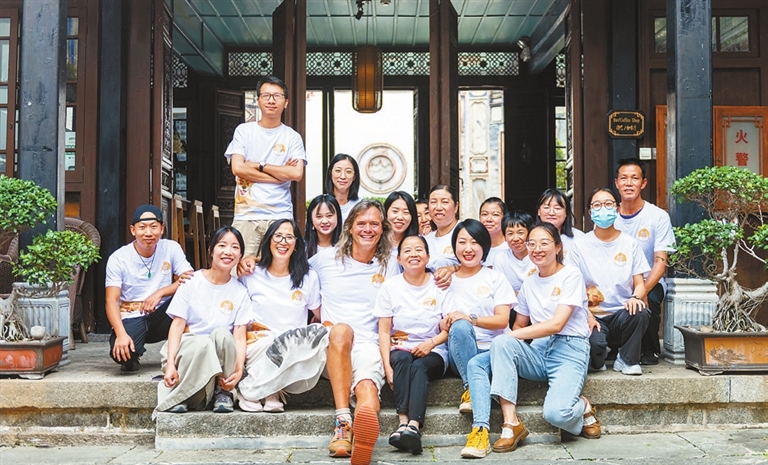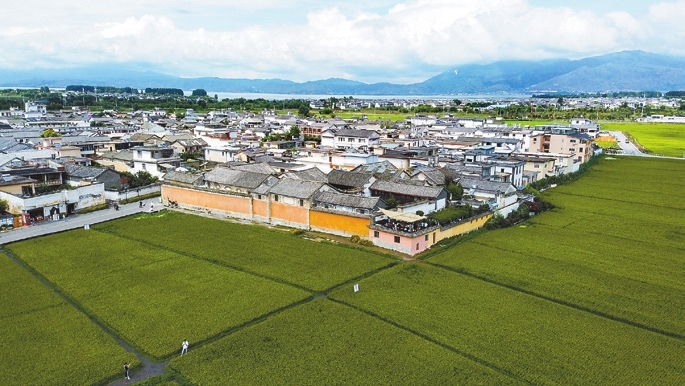


OVER a decade after opening his first hotel and cultural center in Xizhou Township of Southwest China’s Yunnan Province, Brian Linden and his team opened their third project in 2021 in the province’s Shaxi Township, with the new site overlooking an ancient Bai ethnic village and a tranquil lake. In 2008, Linden, an American entrepreneur, and his team restored and repurposed heritage buildings and turned them into popular destinations for experiencing the rich cultural traditions of their respective surroundings. He named his boutique hotel brand the Linden Center, a place for comfortable lodging and also for cultural and interpersonal exchange. Linden and his partners aspire to restore the local buildings and contribute to heritage conservation. “Over the past few decades, many foreigners were attracted to China by the huge economic opportunities, but very few spent time to learn about the country’s rich history,” said Linden. “We want to encourage foreigners to view China differently, not solely for financial purposes.” A new world Before first coming to China in 1984 as an international student, Linden worked as a carpet cleaner in Chicago. “I was cleaning the carpet at the house of a professor of the University of Chicago, who had just returned from a trip to China, and he asked me to put a red flag to mark China on the world map,” recalled Linden. “But with limited education, I didn’t know where China was.” Out of curiosity about the country, Linden applied for a Chinese government scholarship. To his joy, his application was accepted and he got an opportunity to study in Beijing. His first encounter with China was full of surprises and unexpected opportunities. “When I was working out on the street on the third day after my arrival in Beijing, I was tapped by a director who asked me to act in a Chinese film,” he said. Four years later, Linden left China with his wife, whom he met in East China’s Nanjing City, to pursue doctoral studies at Stanford University. He later began to work on educational projects all over the world. During his extensive international travels, what disappointed him most was the outside world’s lack of understanding of China. “I’ve been to over 100 countries, but people in most of those countries have a limited understanding of China, and I want to provide them with a more balanced view of this country,” Linden said. “To achieve this goal, my team and I want to create social enterprises in each site, which can ensure that local villagers receive financial benefits, and visitors can enjoy an interactive experience, instead of solely experiencing the comforts and luxury of travel,” Linden added. With this goal in mind and his passion for China at heart, Linden shared his idea with his wife, a third-generation Chinese-American, and their two sons, who were 6 and 9 then. His family was very supportive of his decision and they decided to move back to China in 2003. Culture center The Lindens then traveled to multiple provinces in China in search of a suitable location for his culture center, and in 2007, they found a historic building in the Xizhou ancient town, situated between Erhai Lake and Cangshan Mountain in Dali. The architecture has the rectangular layout of traditional Bai-style courtyards, with the screen wall facing the entrance decorated with conventional paintings and living quarters lining the other three sides of the courtyard. “I got a strong sense of belonging the first time I came to Xizhou,” Linden said, adding that the local villagers are inclusive and welcoming, and they all call him “village head Linden.” With the support from the local government, Linden and his team renovated the historic courtyard, and began to recruit locals as hotel staff. Owing to its uniqueness and amiable services, the Linden Center in Xizhou became one of the top-rated boutique hotels in China on TripAdvisor, a leading travel platform. Linden, a former educator, wishes to provide an opportunity for young people from around the world to comprehend the richness of this country beyond the modern high-rises of Shanghai and Beijing. In 2012, Linden and his team rented another courtyard originally belonging to the Yang Zhuoran family and refurbished the architecture into an international education base. They partnered with schools and universities to launch educational programs. Students can stay at the base, learn about local culture and nature, and come up with documentaries, research papers or acquire traditional handicraft skills. “As I envisage it in the future, Linden Center is not just my accomplishment, but also a legacy of the Bai people in Xizhou, China, and a gift for the world,” Linden said. Similar to local Bai-style houses in the nearby Shilong Village, the Lindens’ new hotel in Shaxi is built with the traditional material of rammed earth, so that it blends well with its surroundings. Designed by returning University of California, Berkeley graduate student Mou Yujiang, who is also the CEO of Linden Center, the project received the American Architecture Award in 2018. Reflecting on the past decade, Linden said he sees optimism and hope whenever he talks with his neighbors because everyone is seeing more opportunities. “When you see small villages are now connected to the rest of China by high-speed railways and new highways, how can you not be optimistic?” (Xinhua) | 
